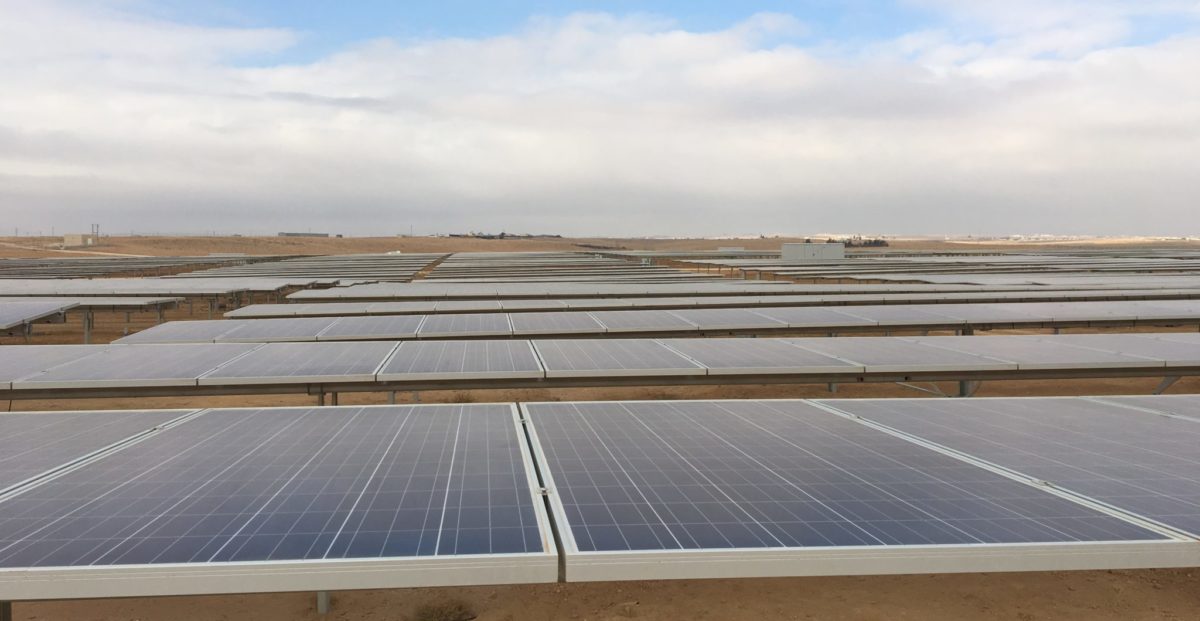The Jordanian solar power program has received a further financial boost, as the European Bank for Reconstruction and Development (EBRD) announced plans to support a 50 MW solar PV plant, located 300 km north-east of the capital city of Amman, where it is set to progressively replace a nearby aging 150 MW gas-fired power plant.
The $22 million loan will be issued to Solar Power Projects PSC, a Jordanian company fully owned by ACWA Power, the Saudi Arabian power group, alongside parallel loans from the German Investment Corporation DEG and the Arab Bank, worth $16 million each.
“This project will progressively replace the aging gas-fired plant with a new solar installation generating the cheapest power in Jordan while using the existing transmission line. It is the eighth solar PV project financed by the EBRD in the country during the past four years, bringing the total installed capacity of power projects supported by the Bank in Jordan to more than 1,100 MW,” said Harry Boyd-Carpenter, EBRD Director for Power and Energy.
He notes that the Risha project demonstrates what can be achieved in an environment where the regulatory framework, the tariff design and access to finance allow for the successful use of renewable sources of energy.
Including the 50 MW Al Safawi solar plant, signed in September, the EBRD has financed 145 MW of renewable generating capacity in Jordan during 2017 alone, in an effort to back the country’s energy transition in the face of serious challenges arising from the refugee influx.
Backing green finance
Following an approval by its Board of Directors, the EBRD is also gearing up to release up to $100 million for “Amundi Planet – Emerging Green One” – the world’s largest green bond fund, having raised over $1.2 billion so far.
The development bank announced it will invest up to 5% of the fixed-income fund, which was established in July by Amundi, a privately-owned investment manager, and the International Finance Corporation (IFC), a member of the World Bank Group.
The fund is said to be the first of its kind, dedicated exclusively to emerging markets with a focus on investing in green bonds issued by private sector financial institutions.
Popular content
The fund aims to allocate at least triple the amount of the EBRD’s investment to the bank’s countries of operations, as part of its regional diversification policy.
EBRD President Suma Chakrabati said in a statement that the fund is expected to increase the availability of green finance in the EBRD regions, increase investor awareness of green capital market products, and support local financial institutions in issuing green bonds, in line with the Green Bond Principles.
In addition to the investment, the EBRD is launching a dedicated Green Bond Technical Cooperation Programme focusing on capacity building and green bond origination in EBRD countries of operations, thus increasing green bond supply to enable the financing of green projects.
Against the backdrop of rapid growth in the global market for green bonds which, according to the U.K.-based Climate Bonds Initiative, saw more than $100 billion of issuance in 2017 alone, the EBRD stands out as not only an investor, but also a major issuer. Since 2010, the bank has issued 65 green bonds worth €2.3 billion.
Greening the cities
Launched at the One Planet climate summit in Paris today, the Green Cities Climate Finance Accelerator, established under the partnership of the EBRD and the Global Covenant of Mayors for Climate and Energy (GCoM), an alliance of close to 7,500 cities and local governments, will speed up and increase the delivery of finance for city climate projects worth $1.5 billion.
The EBRD will allocate over $500 million in “first mover” financing aimed at leveraging additional third party contributions for the development and implementation of city action plans and projects in up to 60 cities, including many that have not been a focus for climate support so far.
The initiative was launched in the presence of European Commission Vice-President Maroš Šefčovič, who co-chairs the GCoM with Michael Bloomberg, the UN Secretary-General’s Special Envoy for Cities and Climate Change.
This content is protected by copyright and may not be reused. If you want to cooperate with us and would like to reuse some of our content, please contact: editors@pv-magazine.com.



Allow me point out that before the December 2017 One Planet Climate Summit in Paris there was the 2017 North American Climate Summit in Chicago at which the 2017 Chicago Climate Charter was signed.